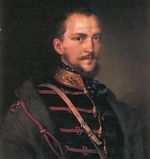How to Pronounce Artúr Görgei
#50
Most Popular
Boost
Jan 30, 1818 Toporec, Prešov Region, Slovakia Died on 21 May 1916 (aged 98)
Hungarian military leader
AquariusArtúr Görgei, Date of Birth, Place of Birth, Family, Facts, Age, Net Worth, Biography and More in FamedBorn.com

Hungarian military leader
Aquarius